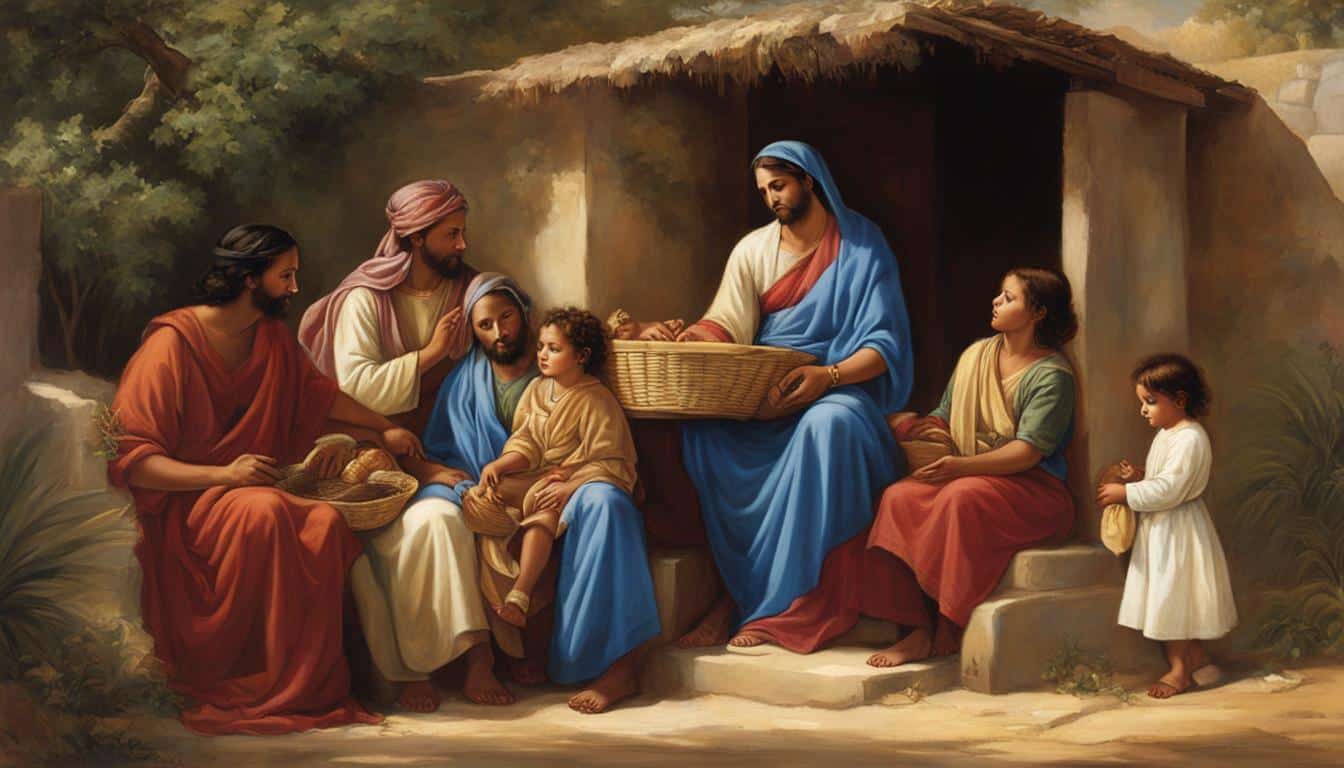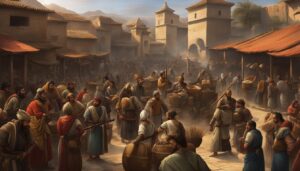
The Bible provides valuable insights into the topic of gender roles and family life in ancient times. From a biblical perspective, we can examine the roles and expectations placed on men and women in the context of marriage and society. By exploring the biblical view of family life, particularly in the Old and New Testaments, we can gain a deeper understanding of how gender roles were understood and practiced.
Key Takeaways:
- The Bible offers principles and regulations regarding behavior and roles for men and women.
- Complementarians argue for traditional gender roles in marriage, with husbands as leaders and wives as submissive followers.
- However, the biblical evidence for husbands being rulers or leaders is limited.
- The Old Testament emphasizes equality, similarity, and unity between men and women.
- The roles and activities of men and women in ancient Israelite society varied.
Gender Roles in Marriage
The biblical view of gender roles in marriage has been interpreted in different ways. Complementarians argue that husbands should be the leaders and wives should be submissive followers. However, the evidence in the Hebrew Bible for husbands being rulers or leaders is limited. While the culture of the Ancient Near East was largely patriarchal, the Bible does not explicitly state that husbands must be the rulers or leaders of their homes. Instead, husbands are instructed to love their wives.
The Old Testament emphasizes equality, similarity, and unity between men and women in the context of marriage. It does indicate that there were some roles and activities that differed between men and women, but these were not based on authority and submission. The focus is on mutual love and respect between spouses. In fact, the book of Proverbs describes the ideal wife as a strong and capable woman who contributes to the welfare of her household. This challenges the notion of women being solely submissive and subordinate to their husbands.
It is important to recognize that the biblical teachings on gender roles in marriage should not be understood as promoting inequality or subjugation. Rather, they encourage a partnership where both spouses contribute and support each other. The emphasis is on mutual love and respect, with each partner fulfilling their roles and responsibilities in a way that promotes the well-being and harmony of the marriage.

The Ideal Wife
“A wife of noble character who can find? She is worth far more than rubies.” – Proverbs 31:10
This quote from the book of Proverbs highlights the value and importance of a capable and virtuous wife. It emphasizes the significance of a woman’s contributions to her household and recognizes her worth as being far greater than material wealth. The ideal wife described in Proverbs 31 is portrayed as a competent and industrious woman who manages her household, engages in business, and cares for her family. This depiction challenges traditional gender roles and showcases the biblical recognition of women’s abilities and strengths.
Gender Equality in the Bible
- The Old Testament emphasizes equality, similarity, and unity between men and women in the context of marriage.
- The biblical teachings on gender roles should not be understood as promoting inequality or subjugation.
- The focus is on mutual love, respect, and partnership between spouses.
- The ideal wife described in Proverbs 31 challenges traditional gender roles and recognizes women’s contributions to the household.
Overall, the biblical perspective on gender roles in marriage supports the idea of equality and mutual respect between spouses. While there may be differing roles and responsibilities, the emphasis is on love, support, and partnership. The biblical teachings call for a harmonious and balanced relationship where both husband and wife contribute to the well-being of their marriage.
Gendered Occupations and Activities
In ancient Israelite society, gender roles determined the types of occupations and activities that men and women engaged in. Men were primarily involved in farming, working as artisans, and participating in military conflict. On the other hand, women played crucial roles during times of war and were also involved in agriculture, as well as fulfilling their roles as wives and mothers.
During times of military conflict, women in ancient Israelite society displayed remarkable bravery and resourcefulness. They acted as spies, hiding spies, and negotiating for the safety of their towns or families. Their involvement in war was not limited to supportive roles; they actively participated in strategizing and protecting their communities.
“The women of ancient Israel were not just passive onlookers in times of conflict. They were active agents, contributing their skills, intelligence, and bravery to ensure the safety and well-being of their people.”
Women were also actively engaged in agriculture, with certain tasks predominantly assigned to them, such as carrying water. Both men and women participated in shepherding and harvesting grain crops. Women were skilled in milling grains, and there are examples of women taking on leadership roles in agriculture, such as obtaining land for farming or building towns.
| Occupations | Men | Women |
|---|---|---|
| Farming | ✓ | ✓ |
| Artisans | ✓ | ✓ |
| Military Conflict | ✓ | ✓ |
| Shepherding | ✓ | ✓ |
| Grain Harvesting | ✓ | ✓ |
| Milling Grains | ✓ |
The roles and activities of men and women in ancient Israelite society were diverse and multifaceted. While men were primarily engaged in farming, being artisans, and participating in military conflict, women played vital roles in times of war, agriculture, marriage, and motherhood. This demonstrates that gender roles were not rigidly defined but depended on the needs and circumstances of the community.
Conclusion
The biblical narratives provide valuable insights into gender roles and family life in ancient Israelite society. While some argue for traditional gender roles in marriage, the biblical evidence for husbands being rulers or leaders is limited. Instead, the Hebrew Bible emphasizes equality, similarity, and unity between men and women, with husbands instructed to love their wives.
When it comes to occupations and activities, men were primarily engaged in farming, being artisans, and fighting, while women played critical roles during times of military conflict and were involved in various aspects of agriculture. Women also held significant roles in marriage and motherhood, as the Old Testament places importance on these aspects of a woman’s life.
Overall, the Bible offers principles for family relationships, emphasizing the importance of love, mutual respect, and shared responsibilities. While there may be differing interpretations regarding specific gender roles, the biblical teachings on family dynamics highlight the significance of these principles. The biblical narratives provide a foundation for understanding family life and relationships, guiding individuals in navigating their roles and responsibilities within the context of their own families.
FAQ
What does the Bible say about gender roles in marriage?
The Bible contains principles and regulations concerning behavior, with various passages implying different roles or activities for men and women. In terms of gender roles in marriage, complementarians believe that husbands are to be leaders and wives are to be submissive followers. However, the biblical evidence for husbands being rulers or leaders is limited, with only two verses explicitly mentioning this. The Hebrew Bible emphasizes equality, similarity, and unity between men and women in Genesis, and does not directly address gender roles related to authority and submission in marriage.
Were men considered superior to women in ancient Israelite society?
While the culture of the Ancient Near East was largely patriarchal, the Bible does not explicitly state that husbands must be the rulers or leaders of their homes. Instead, husbands are instructed to love their wives. The Old Testament emphasizes equality, similarity, and unity between men and women in the context of marriage. It does indicate that there were some roles and activities that differed between men and women, but these were not based on authority and submission.
What were the roles and activities of men and women in ancient Israelite society?
In ancient Israelite society, men were primarily engaged in farming, being artisans, and fighting. Women were not typically soldiers, but they played crucial roles during times of military conflict, including acting as spies, hiding spies, and negotiating for the safety of their towns or families. Women were also involved in agriculture, with certain jobs predominantly assigned to girls or young women, such as carrying water. Both men and women could be shepherds and harvest grain crops. The Bible mentions women as milling grains, and there are examples of women involved in agriculture in a more leadership role, such as obtaining land for farming or building towns. The Old Testament also emphasizes the importance of marriage and motherhood for women, and the value placed on beauty in relation to a woman’s role as a wife and mother.
What are the biblical principles for family relationships?
The biblical narratives provide insight into gender roles and family life in ancient Israelite society. While complementarians argue for traditional gender roles in marriage, the biblical evidence for husbands being rulers or leaders is limited. The Hebrew Bible emphasizes equality, similarity, and unity between men and women, with husbands instructed to love their wives. In terms of occupations and activities, men were primarily engaged in farming, being artisans, and fighting, while women played important roles during times of military conflict and were involved in agriculture, as well as in marriage and motherhood. Overall, the Bible offers principles for family relationships, emphasizing the importance of love, mutual respect, and shared responsibilities.








